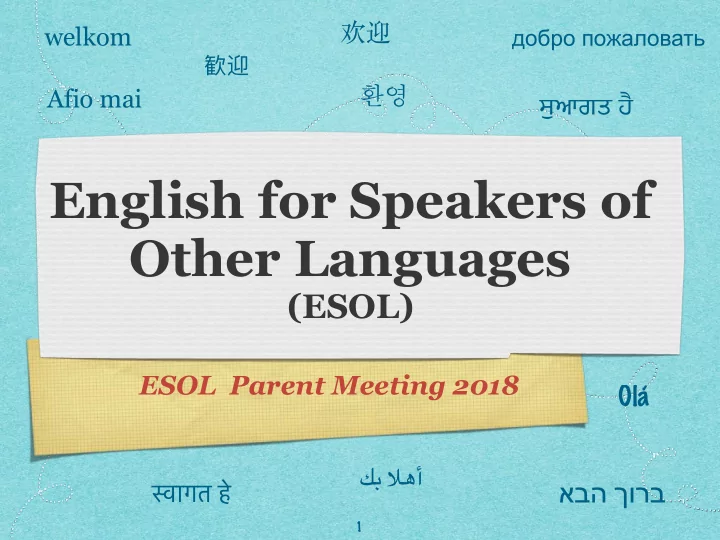

歓迎 欢迎 welkom добро пожаловать 환영 Afio mai ਸuਆਗਤ ਹ� English for Speakers of Other Languages (ESOL) ESOL Parent Meeting 2018 Olá كب لبهأ स्शागत हे אבה ךורב � 1
Terminology ESOL English for Speakers of Other Languages ELL English Language Learner ELA English Language Assistant First Language The language spoken at home (mother tongue, heritage/home language) ESOL Parent Meeting 2018 � 2
Meet the ESOL Team • Nicola Kingston - ELL Lead Teacher • Selina Chan - English Language Assistant (ELA) • Marie Cutler - ESOL Teacher • Tania Pook - ELA • Winnie Chong - ELA • Vinola Naicker - ELA � 3
Why is my child on the ESOL programme ? • A language, other than English, is spoken at home • Assessed using the English Language Learning Progressions � 4
English Language Learning Progressions • English Language Learning Progressions (ELLP) • ELLP describe the listening, speaking, reading and writing expectations for students whose first language is not English • English language learner pathway - stands alone • Students are assessed twice yearly, by the classroom teacher • A score is achieved � 5
How long on the programme? Time on programme: • NZ born students - up to 3 years funded • Migrant students - up to 5 years funded � 6
Variety of Programmes Nicola Kingston - Junior, Middle, Senior class groups Marie Cutler - Middle school groups Focus on topic vocabulary: Junior - Myths and Legends Middle - New Zealand Birds Senior - Ancient Civilisations/Ancient Egypt Juniors: 2x 30 minute lessons Middle and Senior - 1 x 1 hour lesson � 7
Variety of Programmes Tania - Talk to Learn with selected groups of Juniors Talk to Learn is an oral language programme 4x 30 minutes a week Selina - works with a variety of students up to 4x 30 minute sessions a week Some students alphabet and vocabulary support Some students for reading and writing support *In class � 8
Part Two: Second Language Acquisition � 9
Learning a Second Language 2 parts to language learning 1. Conversational Language • social language/ day to day language • playground language • 6 months-2 years to develop
Learning a Second Language 2. Academic Language/Curriculum Language The language used in topics such as science and social studies. Can take 5-7 years to develop. Learning a language can be a long process. • Speaking assessed against this � 11
How can I help my child? • c ontinue to speak your first language at home • first language development and literacy is vital � 12
First Language Research shows that: ‘the deeper a student’s level of first language... development, the faster students will progress in their second language’ (i.e English). (Thomas and Collier, 1997). � 13
Reading • talk about the pictures in your first language • ask questions about the book in your first language • read every day - even in the holidays � 14
Top Tips Join and use the library Read every day - even in the holidays Have bilingual material at home Join after school activities Have playdates with friends of other languages Be patient with your child’s learning Keep talking in your first language � 15
Sleep is important too! • sleep plays an important role in your child’s ability to function • lack of sleep makes it harder for your child to concentrate • the right amount of sleep is just as important to children’s development as healthy eating and exercise • between the ages of five and eleven, your child will need 10 -12 hours of sleep a night � 16
Parent Resources Point View School website: • ELL students page • translated Resources for parents: • Supporting English language learners • Supporting your child’s learning • Talking with your child helps them learn � 17
Discussion * find a group who speak the same language as you and talk about the information from today Mandarin, Cantonese, Korean, Hindi, Punjabi, Arabic, Russian, Tongan, Afrikaans, Samoan, Hebrew, South East Asian, Portuguese * enjoy a cup of tea or coffee and something to eat � 18
Thank you for your attendance We look forward to your continued support. 8 0 1 2 n g i e t M e n t r e a P O L S E � 19
Recommend
More recommend